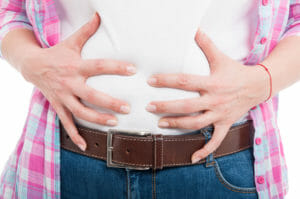We get lots of questions from you about peri/menopause so we’ve put eight of the most asked together.
1. What’s the difference between perimenopause, menopause and post-menopause?
Most people, even doctors, talk about menopause as an umbrella term. However, this isn’t technically correct because many of the – sometimes life-disrupting – signs begin in the lead-up to menopause known as perimenopause. Or, peri as it’s often called.
Peri occurs when our hormone levels begin to change and we come to the end of our fertile years. We can still fall pregnant during this time although it’s much more difficult. Perimenopause can begin as early as your late 30s. And it lasts on average four years but can go on for over a decade. There is no one size fits all in terms of time or experience.
Perimenopause leads into menopause itself, which is when our periods stop. We only know we are officially in menopause one year after our last period. So, essentially it’s a non-event because by this time we are already in post-menopause. It’s why we tend to focus on peri and post-menopause here at MenoMe®
2. I’m itchy all over, is this a sign of perimenopause?
Yes, itchiness can be one of the signs of peri and it’s not very comfortable. You can read more about it here.
Bear in mind too that midlife itchiness doesn’t just affect your limbs and body. You may find yourself experiencing an itchy vagina too, which we know drives some of you crazy. Coconut oil can help and we’ve also heard good reports about Sylk Natural which you can get all over the world.
I’d also recommend keeping hydrated with lots of pure water and high water content foods like cucumber, watermelon, and other fruits and vegetables. Try adding a little bit of fresh lemon juice to your water to keep your body alkaline and a dash of sea salt for trace minerals.
3. I’m having dizzy spells, could there be something wrong?
I know this one well and it can be quite scary. 😱 It’s usually another symptom of the meno years and a very common one. It’s not that well understood but if you’re experiencing this please know that you’re not alone. You can read all about it here.
4. My sex drive has disappeared what can I do?
This is another common side effect of midlife so it’s lucky that lots of you report having understanding husbands! We get that it’s distressing. We’ve gone a bit deeper into it here for you.
Along with the vaginal changes that can affect your sex drive, incontinence can also be an issue. You can read more about that Incontinence.
Listen: Where has my libido gone?
Watch: Men Are From Mars, Women Are From Venus with John Gray
5. All of a sudden I’ve developed a fear of driving. Is this normal?
Unfortunately, we’ve heard this one a little bit. As well as an aversion to going out socially, visiting the supermarket and anywhere where’s there’s bound to be quite a few people. (My hand is up!) It can get so bad for some women that they begin hyperventilating and go into a panic attack. Breathing is your number one tool here. Breathe in deeply for the count of eight, out for the count of eight, in for the count of eight, out for the count of eight and so on until you feel calmer.
Related:
6. I’m experiencing cravings and bloating like never before. What gives?
Bloating is frustrating! Who likes feeling pregnant and distended? Again it’s often down to fluctuating estrogen levels. In addition, our digestive system can go through a lot of changes. The best advice? Keep hydrated by drinking lots of water. Eat lots of prebiotics, take a probiotic and add fermented foods to your daily victuals like kimchi, kefir yoghurt or sauerkraut. Cut processed, refined foods like carbohydrates and sugars out of your life and stick to whole foods.
Try our synbiotic – a prebiotic/probiotic combination Happy Go Tummy® here.
Watch the webinar: Digesting Midlife – How Gut Health Impacts Your Menopause Journey
At the bottom of this piece, you’ll also find a link to It’s Not Just About Estrogen. I highly recommend having a read. 😊
7. Can I take Merry Peri® or Perky Post® if I have been through breast cancer?
Merry Peri® contains saffron, fenugreek and sage. And Perky Post® contains saffron, fenugreek, sage, resveratrol, vitamin D3 and vitamin K2. They are evidence-backed and have a long history of use in folk medicine.
However, this combination of ingredients hasn’t been researched in the instance of hormone sensitive cancer. So we always suggest you talk to your medical professional prior to taking if you have any health condition, including cancer.
8. Will Merry Peri®, Perky Post® or Happy Go Tummy® help me lose weight?
Weight gain is one of the biggest bugbears for women in midlife and can be a by-product of hormone changes and/or growing older. In addition, that pesky meno belly can also be due to digestion issues. However, the fabulous news is that it’s manageable with the right tools.
In answer to the question though Merry Peri® and Perky Post® aren’t formulated for weight management. Rather they’re designed to help with hormonal shifts. Theoretically though, by supporting your hormones they may make it less difficult to manage your weight. This hasn’t been tested.
On the other hand, Happy Go Tummy® supports your gut health which may help with bloating, constipation and – in some cases – accumulated weight.
Perhaps try reading ‘It’s Not Just About Estrogen’ to understand what’s going on in your body it.
As always, we hope this helps. 😊😊😊
If you have any other common questions please don’t hesitate to send them through. 😊
Disclaimer: this is not an in-depth article on hormones and is intended as a guide only. If you feel you need more help and advice please see a qualified functional medicine practitioner











